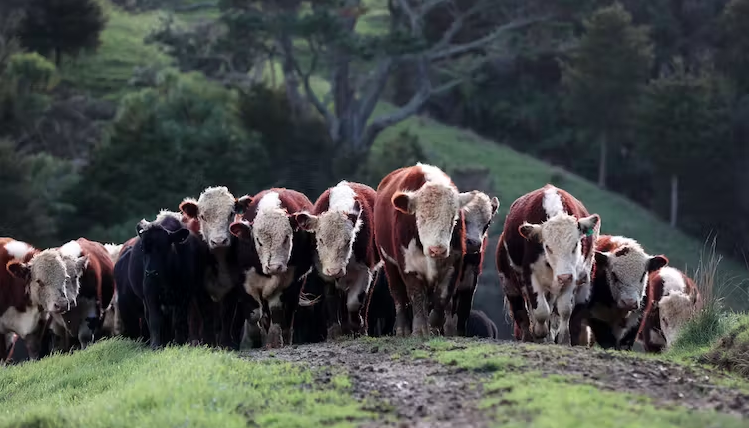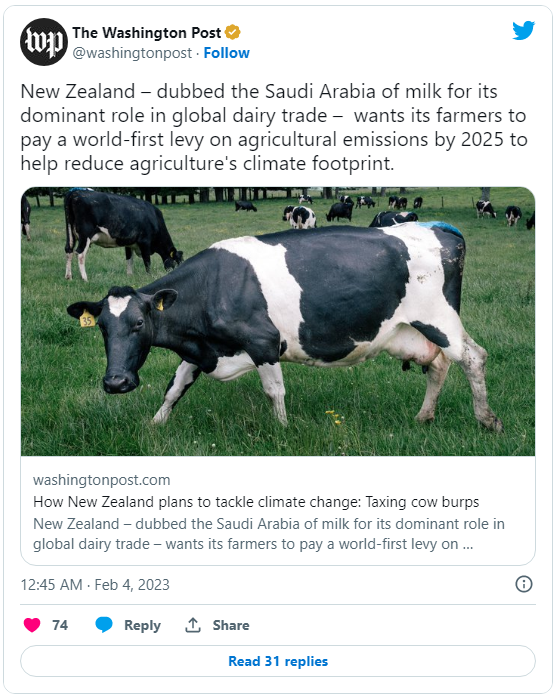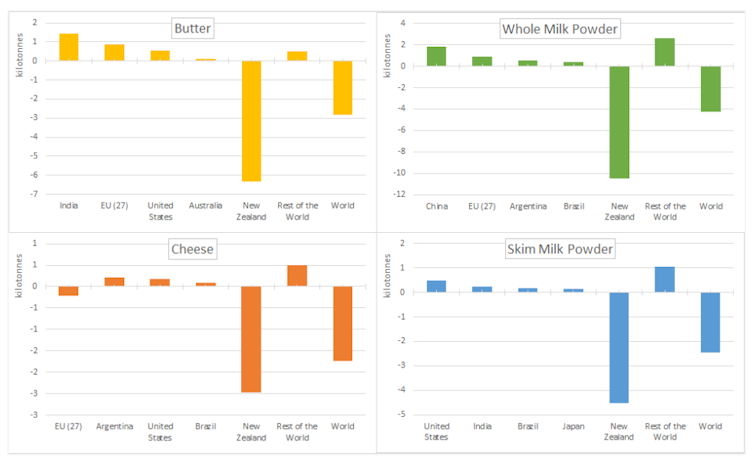
By Anita Wreford, John Tobias Saunders and Meike Guenther*
The recent report issued by the Intergovernmental Panel on Climate Change (IPCC) underscores the urgency of emissions reductions. For Aotearoa New Zealand, where 50% of emissions come from agriculture in the form of methane and nitrous oxide, this means the primary sector must be part of the response.
New Zealand is indeed the first country to investigate introducing a price on agricultural greenhouse gas emissions.

The most recent pricing proposals would require farmers to pay a levy on their agricultural emissions. To begin with, only 5% of emissions would be priced, with proposals to reduce the 95% free allocation gradually over time.
Much of the existing modelling shows emissions could be cut by up to 10% by reducing the intensity of production, often through lowering animal numbers and fertiliser use. This doesn’t necessarily mean lower profitability. With good pasture management, farmers may be able to reduce stocking rates and increase profits.
But Aotearoa is already one of the most efficient producers of meat and dairy products globally. If we reduce emissions here, will that not simply lead to other, less efficient countries picking up the lost production, while our farmers pay the price?
This idea is known as “carbon leakage” and is often used as an argument against any domestic policy that could result in reduced agricultural production. The issue is important as New Zealand depends heavily on agricultural exports. In 2022, of all merchandise trade, 65% were agricultural commodities.
Understanding whether carbon leakage will occur or not is a complex task. Here, we look at what evidence we have and insights from agricultural trade modelling.
New Zealand modelling
It’s difficult to know exactly what might happen in agriculture, as emissions pricing on agricultural products has not yet been used elsewhere. There is no historical evidence to draw on.
International modelling studies present a mixed picture of the likelihood of leakage: an OECD study estimated 34% of agricultural emissions would be leaked, mostly to developing countries.
Recent modelling for New Zealand examines a series of scenarios of domestic pricing on its own as well as international pricing. The results show that for the current proposal where only 5% of emissions are priced to begin with, with a 1% increase each year, New Zealand’s production of meat and dairy products could decline by 2050.
The effect on dairy producers would be a loss of returns of under 1%, while meat producers would face a 6% decline. Some of the production would be taken up by other countries, but the overall volume would be lower than in the baseline situation, where no emissions pricing existed.

This shows leakage may occur, with reductions in production of New Zealand dairy products. But global meat and dairy production by 2050 would be considerably lower than without the policy, which would have a positive overall impact on the climate.
As the proportion of emissions that are priced increases, we expect the quantity of meat and dairy produced in New Zealand to decrease. This in turn could increase the volume of leakage. –
More sustainable future diets
It is important to remember that although there is a reduction in meat and dairy production, there is likely to be an increase in the production of other types of food which doesn’t contribute so much to climate change.
A recent study shows how food consumption alone could contribute an additional degree of warming above preindustrial temperatures by 2100. This demonstrates the importance of food choices in addressing climate change.
Many of New Zealand’s trading partners are exploring and beginning to implement their own agricultural emissions-reduction goals and targets. Internationally, there is an increasing focus on the role international trade rules can play in addressing climate change, including border carbon adjustment mechanisms and environmental standards for imports.
In a similar scenario as described above, but where New Zealand’s main competitors also take action, New Zealand may actually see a small increase in production by 2050, despite the domestic pricing policy.
The extent of leakage therefore really depends on how other countries tackle their own emissions. Economy-wide net zero emissions targets are in place for Australia, Chile, European Union countries, the US and the UK by 2050, and for China by 2060.
The opportunity for leakage would be significantly reduced through multilateral agreements or through regional or bilateral commitments within trade agreements.
New Zealand could decide to be a leader and demonstrate to the rest of the world a commitment to reducing emissions from our highest emitting sector. This may result in some leakage initially, but this would likely decline as other countries take similar action.
Or we can wait until other countries begin to take more serious action on agricultural emissions. But in the meantime, emissions reductions will increasingly be driven through finance and private-sector initiatives, for example through access to processing companies, which are progressively requiring emissions reductions throughout their value chains and through lending and finance, where banks are beginning to offer reduced interest rates for sustainable practices.![]()
*Anita Wreford, Professor Applied Economics, Lincoln University, New Zealand; John Tobias Saunders, Research Officer, Lincoln University, New Zealand, and Meike Guenther, Research Officer, Lincoln University, New Zealand. This article is republished from The Conversation under a Creative Commons license. Read the original article.
27 Comments
For Aotearoa New Zealand, where 50% of emissions come from agriculture in the form of methane and nitrous oxide, this means the primary sector must be part of the response.
Only if you used screwed methods to run the numbers
Some ppl in NZ is crazy.
GHG emissions must be the last thing on NZ.'s agenda.
At least we aren't planning an invasion to divert attention from a crumbling economy.
You have already invaded Australia, New Zealand, North America and south America, and slaughtered most of their indigenous ppl.
I'm actually reticent to say the following and mean no disrespect to the absolute legends at interest.co.nz:
There seems to be woke tiptoe happening around these parts.
LOL, it must have been from a distance? I haven't been to any of those continents.
Blah, junk science and junk policy.
Highway robbery.
Farmers should not put there collective heads in the sand, some will I am sure, but most will not.
Some will get ahead of whatever system becomes established for farm generated green house gas emissions, as a system will eventually come into effect based on "good" science. All the politicians have to do is stay out of the mix as they all have hidden agendas depending upon which side of the political divide they sit on, and they are all as bad as one another.
By getting ahead, I mean they will replace all existing petrol/diesel motors with electric, and been seen to be doing something as these farmers are sensible and considerate.
I think most of us farmers will get ahead by increasing our use of fossil fuels (real science), to feed the people we care about and it will not be a politician I feed.
So leakage is driven by the cost of emissions reduction in NZ farming and therefore countries that buy our meat and dairy producing more of their own? Food security concerns in emerging countries is driving this, and also in many of these locations they are urgently working on emissions controls as they are also experiencing climate effects first-hand. I think NZ needs to get started, we are falling behind other markets.
I would literally rather see the apocalyptic claims of these enviornmentalist grifters tested. I really would, let's see the earth raises its average temperature by 2 or 3 degrees and turn into Venus. All of these climate models constantly smell of poor statistical inference.
The cultish nature of the discussion of this stuff, the inability to even question it and the neoliberal market making around emissions is very smelly. The point seems to be about 'modifying' behaviour and encouraging people not to raise animals to fart methane, but what is the relative proportional impact of that methane?
The earth was populated by land dwelling beasts for hundreds of millions who farted, stomped all over and ate/destroyed vegetation. Can someone please explain, in rational terms, why animal husbandry is being targeted so heavily relative to anything else?
"Why animal husbandry is being targeted so heavily relative to anything else?" Because it's a soft target. No one wants to stop their overseas trips, driving their 4wds, or rising property prices through increasing population and attendant emissions. Farming can take the hit because it doesn't affect most people and the increase in production costs probably won't be recovered by increasing output income. That, and I'm sure there is a little behind the scenes diversionary nudge from the FF industry funding evangelical vegans.
Actually if we remove the consultants and sustainability firms and advisors all telling companies how to count or reduce emissions a considerable chunck of climate change cost could be eliminated. Once the confusion and hype is removed and we start to actually apply efforts to actual emissions solutions we can get there. the approach in NZ as the most efficient producer should be to continue to innovate ahead of competition and then take this out into the world.
If played correctly why cant NZ grab a larger share of global food sector? This should be a winner for NZ not a loser.
Money
Appropriate username.
Any ideas how NZ will pay its way after our farming industry has collapsed?
If we are smart about it, we could very well get higher prices for our products, while producing less. Because if we are the only ones pricing carbon into our beef/dairy production, this is a powerful marketing tool to use in the supermarkets of advanced economies. Being the leader here has a clear advantage.
I don't believe CC is bulldust as most posters above seem to think, however even if it is some sort of mass global conspiracy, perception is what matters here. As those advanced economies start to demand lower carbon food, we can fill that niche with our products which will positively impact the prices our goods receive. We just have to damn well make sure we let everyone know. Much like first mover advantage of Tesla who continually makes extremely good margins on their cars from people who can afford them and therefore claim to care about the climate.
Your dreaming Bobbles
consumers pay as little as possible, yes they want everything for low Carbon footprint, low nitrogen footprint and low everything else including a low price. I am not denying the need to reduce our collective foot print, but consumers want plenty when asked but pay stuff all
So nobody pays for premium quality anything around the world, according to your definition? I mean we have direct examples of it in our exports, A2 milk, our apples, our kiwifruit etc. So I don't buy your argument in the slightest because we have products we are selling now that contradict your argument.
We can target higher end market for milk as well and carve our own niche, just as we have with other products. We need to break away from the race to the lowest price for our milk/dairy and change back to what we really should be, highest quality with the best environmental credentials. Being a small country, we are never going to win the low quality/volume producer market, we don't have the scale or land available. And trying to get there makes us poorer as a nation, lowers our drinking water quality, the environmental degradation is obvious.
blobbles there are certified zero carbon farms going in to pines now - ironically previously owned by people in the meat market trade. Going for the "zero carbon" market segment didn't save them. No farmer can can't compete with the insane amounts of money being thrown at carbon bludgers.
Correct and getting farmers higher prices for milk/beef products on very good land would help to solve this. Because at the end of the day its an economic decision from them - if I can make more putting it into forestry, that's what I will do. My proposition is that we sell higher value goods from the land, which everyone thinks isn't possible, despite us doing it in lots of other cases.
You'd think even the most rock headed denier would have noticed the climate, even in temperate NZ, has changed dramatically, esp since 1980. Just blowing off frustration gas I guess?
I look at the rising minimum wage, and "living wage" and wonder why anyone would bother farming at all? With rising costs of inputs eating margins and the promise of a farmer only tax, the pressure is on to intensify, consolidate and the disappearance of family farming.
I don't believe in the current world of deglobalisation and a disappearing middle class, that premium carbon neutral red meat from the other side of the planet will be a shopping basket priority. I hope it is, but if China goes full rogue on Taiwan as a distraction to its failing economy, that's half our production immediately jeopardised.
This rock headed denier believes climates have changed for 5 billion years and little ole Southland loves it.
Blobbles, globalism is dead. Tesla relies on subsidies, creative accounting, an inflationary stock market and cheap debt to fuel their hoax of electric vehicles saving the planet from a crisis that does not exist. I assume Musk would even agree with me or is he off to mars to start a new factory?
I mean you couldn't be more wrong with all of that if you tried. Do you live in fantasy land?
We still import everything from China, as does most of the world. We export almost all of our goods. Globalism isn't dead in the slightest, but it does have the wobbles.
All electric vehicle companies rely on the same subsidies, currently, until they ramp up and get economies of scale. If you want to talk about who is subsidised and how despicable it is, you might want to focus on the $1t USD that fossil fuel companies are getting every year now on the consumption side, let alone the amount subsidising the production side.
Every major company in the world relies on the sharemarket. Tesla now makes money, so your assertions are utterly false regarding its accounting.
Even your random claim that climate change is a fantastical argument, given scientific consensus around it.
I'll kill a few cows for us chaps - we need to offset this promo.
"Prize inclusions: Return flights to and accommodation in New Zealand, Discover Scuba Experience at Poor Knights Islands with Dive! Tutukaka (Northland), and more merch"
https://www.deeperblue.com/tourism-new-zealand-padi-are-conducting-a-sw…
Though how many will I need to kill to have net result?
"Even more strikingly, if an individual herd’s methane emissions are falling by one third of one percent per year (that’s 7/2100, so the two terms cancel out) – which the farmers I met seemed confident could be achieved with a combination of good husbandry, feed additives and perhaps vaccines in the longer term – then that herd is no longer adding to global warming."
https://www.newsroom.co.nz/ideasroom/a-climate-neutral-nz-yes-its-possi…
From my perspective as a dairy farmer we need to carefully consider the implications of pinning our hopes on mitigating technology such as methane vaccines vs. synthetic ag vs. value in our pasture point of difference.
I’m hoping we can realise value in the nutritional distinction of food derived from pasture.
We welcome your comments below. If you are not already registered, please register to comment
Remember we welcome robust, respectful and insightful debate. We don't welcome abusive or defamatory comments and will de-register those repeatedly making such comments. Our current comment policy is here.